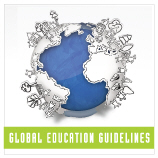Resource Title
Global Education Guidelines – a Handbook for Educators to Understand and Implement Global Education
Summary
The Global Education guidelines is meant to be a pedagogical tool to support educators from formal and non-formal sectors to understand and put into practice global education activities in their respective contexts.
Resource Details
Description
By presenting a global education philosophy and content, related methodology and evaluation issues and by sharing existing practice, tools, resources and bibliography, the resource aim at strengthening global education fundamentals and practices.
Topics presented in the resource:
- Aim at clarifying fundamental questions related to global education
- It suggests strategies on how to build contents
- Put forward aims, skills, values and attitudes
- Offer guidance on methods, curricular design and evaluation
- List useful contacts, links and bibliography
At 87 pages in length, the global education guidelines takes into account in-field practices and references and cultural, geographic, social and economic realities. It has been written on the premise that educational processes in formal and non-formal settings should open the path to a better understanding of an increasingly globalised world.
It also raises important issues about the professional responsibilities of educators and teachers and the role of schools and different organisations and institutions in raising global awareness and knowledge on worldwide issues across the curriculum and in non-formal projects and activities.
Global education, as a style of learning and way of thinking, encourages people to identify links between the local, the regional and the world-wide level and to address inequality.
Big Ideas in this Resource
It is concerned with four main fields of research and action:
- interdependency within a global horizon
- sustainable development
- environmental awareness and concern
- human rights (including anti-racism), democracy, social justice and peace
Global education stresses their interrelationship for humanity as a whole and the close link with international contexts. It addresses issues according to an interdisciplinary approach and gives central importance to all aspects of interdependency, based on active and participative educational methods.
As a special educational action, global education is characterised first of all by interdisciplinarity and by its intercultural-oriented approach, by the above-said theme focus and by the learning objectives which pursue to develop the competencies required of global citizenship.
Global learning mainly aims to develop the abilities to make decisions on one’s own life, competently to take part in social practice and express solidarity with those whose fundamental rights are violated.
By developing the emotional value of learning in addition to its cognitive one, global education relies heavily on interactive techniques which help adjust the content and form of learning to the aims of global education.
Cultural and political pluralism as a global education principle shows in school practice as pedagogical pluralism. It is this pedagogical pluralism that must give students, too, a voice in the definition of programmes and specific activities.
Further information: available from The North-South Centre in Council of Europe website.
Available from:
Download Global Education Guidelines PDF

